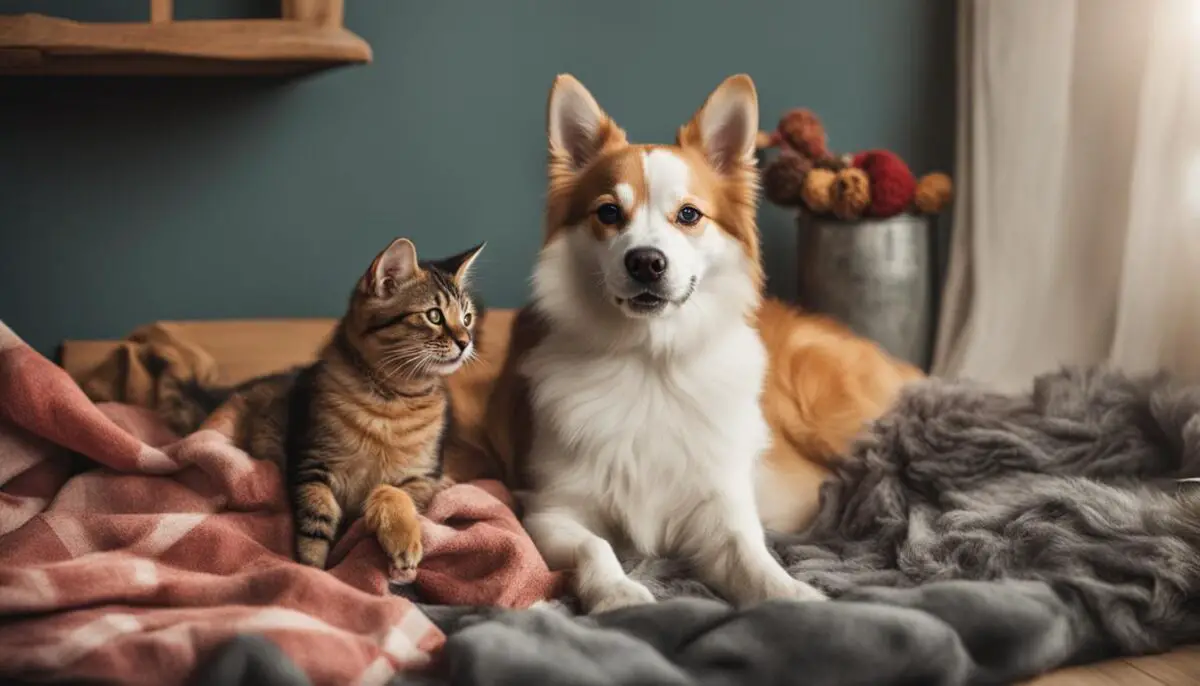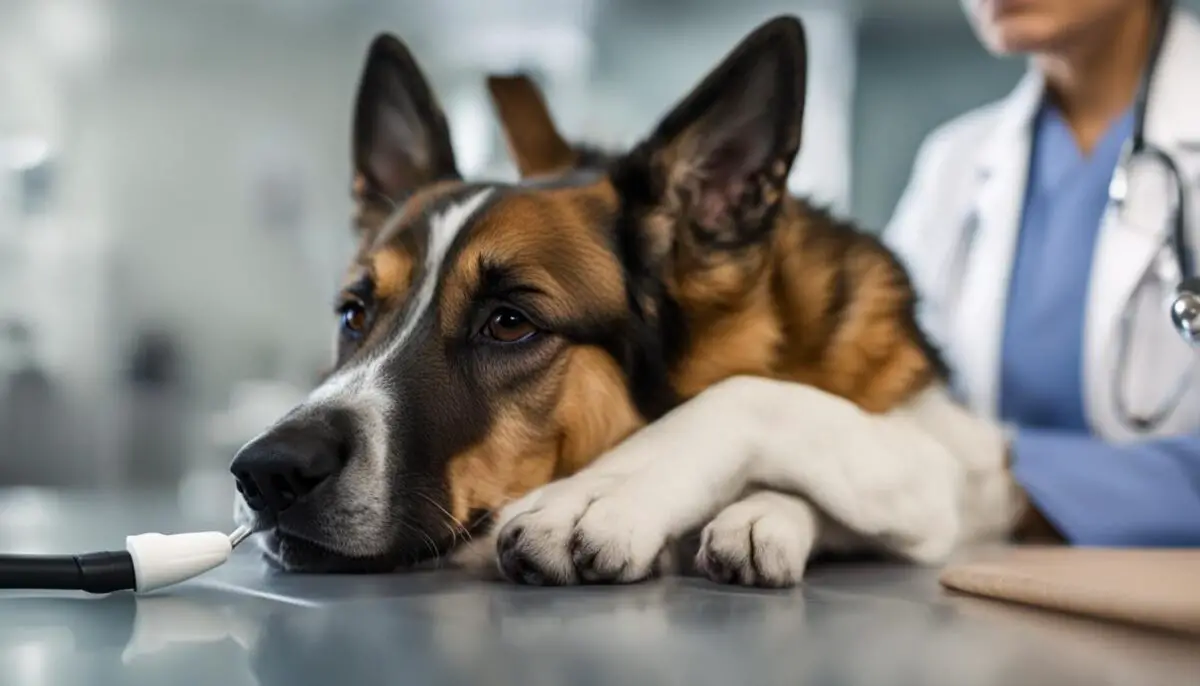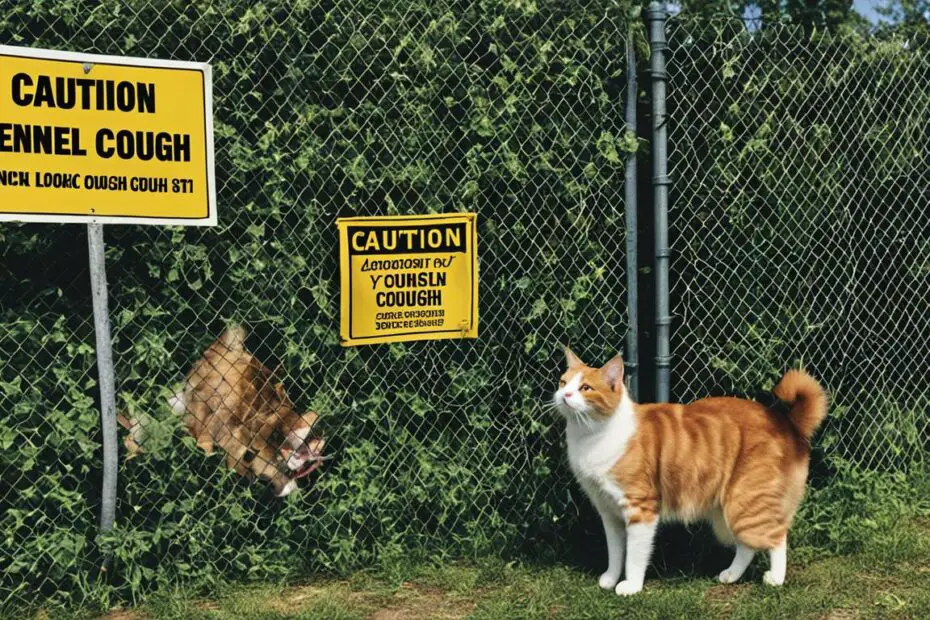Kennel cough is a well-known respiratory infection that affects dogs, causing symptoms such as coughing, sneezing, and nasal discharge. But what about our feline friends? Can cats catch kennel cough from dogs? Let’s take a closer look.
Kennel cough, also known as infectious tracheobronchitis, is caused by the bacteria Bordetella bronchiseptica. While it is less common in cats compared to dogs, cats can still contract the illness under certain circumstances.
The transmission of kennel cough between cats and dogs primarily occurs through direct contact with nasal and oral secretions. This can happen when a cat comes into contact with an infected dog or shares objects such as water bowls or toys.
Key Takeaways:
- Kennel cough can be transmitted from infected dogs to cats through direct contact and shared objects.
- Cats at higher risk of exposure include those in crowded conditions, living with an exposed pet, and those that frequently come into contact with other pets, such as through travel.
- Cats may experience symptoms such as coughing, sneezing, runny nose, eye discharge, fever, lethargy, and loss of appetite if they contract kennel cough.
- A veterinarian can diagnose kennel cough in cats and recommend appropriate treatment, usually involving antibiotics and cough suppressants.
- Proper hygiene practices and preventive measures, such as vaccination, maintaining good overall health, and keeping cats indoors, can help reduce the risk of cats getting kennel cough.
How Cats Get Kennel Cough
Cats can contract kennel cough not only from other infected cats but also from infected dogs. Kennel cough is caused by the bacteria Bordetella bronchiseptica, which can be transmitted through various means.
The primary modes of transmission for kennel cough in cats include:
- Coughing and Sneezing: When an infected cat or dog coughs or sneezes, the bacteria can be released into the air and inhaled by nearby cats.
- Direct Contact: Close contact with an infected cat or dog, such as sharing bedding, grooming, or playing together, can facilitate the transmission of kennel cough.
- Shared Objects: Objects like water bowls or toys that come into contact with the nasal or oral secretions of an infected cat or dog can harbor the bacteria and transmit the infection to other cats.
Cats in certain environments are at a higher risk of exposure to kennel cough. These include:
- Crowded Conditions: Cats in shelters or pet stores where multiple animals are present can easily come into contact with infected individuals.
- Living with an Exposed Pet: Cats residing with a dog or cat diagnosed with kennel cough are more likely to contract the illness.
- Frequent Travel or Exposure: Cats that frequently interact with other pets through travel or regular visits to parks, grooming salons, or boarding facilities have an increased risk of exposure.
It’s worth noting that certain conditions can weaken a cat’s immune system, making them more susceptible to respiratory diseases like kennel cough.

| Transmission Methods | Explanation |
|---|---|
| Coughing and Sneezing | Infectious organisms are expelled into the air through coughing or sneezing, potentially infecting nearby cats. |
| Direct Contact | Close proximity and physical contact with an infected cat or dog can lead to transmission of the bacteria. |
| Shared Objects | Inanimate objects contaminated with the bacteria, such as water bowls or toys, can transfer the infection to cats. |
Can Kennel Cough Spread Between Cats, Dogs, and Humans?
Yes, it is possible for kennel cough to spread between cats, dogs, and humans. Cats can contract kennel cough from infected dogs or other cats, and dogs can also catch the disease from cats. Although rare, humans can potentially get kennel cough from infected dogs or cats. However, it is important to note that human-to-human transmission of kennel cough is extremely rare and unlikely to cause serious illness in healthy individuals.
The transmission of kennel cough between cats and dogs primarily occurs through direct contact with infected animals. The bacteria Bordetella bronchiseptica, which causes kennel cough, can be transmitted through respiratory secretions, such as coughing or sneezing, as well as through shared objects like water bowls or toys.
Humans can accidentally spread the bacteria by coming into contact with a sick pet. It is important to practice good hygiene, such as regular handwashing, after handling a sick cat or dog to prevent the transmission of kennel cough to other animals or humans.
While the transmission of kennel cough between species is possible, it is still important to note that cats are less susceptible to the illness compared to dogs.
Inserting an image to complement the text:

Adding a table to provide additional information:
| Species | Kennel Cough Transmission |
|---|---|
| Cats | Can contract kennel cough from infected dogs or cats |
| Dogs | Can catch kennel cough from infected cats |
| Humans | Potentially get kennel cough from infected dogs or cats |
This table highlights how kennel cough can be transmitted between cats, dogs, and humans.
Common Symptoms of Kennel Cough in Cats
When a cat is exposed to kennel cough, whether from another cat or a dog, it can develop a range of symptoms. Recognizing these symptoms is crucial for early detection and appropriate treatment. Here are some common signs to look out for:
- Coughing: Cats with kennel cough may have frequent bouts of coughing, which can be dry or produce mucus. This cough is often hacking and persistent.
- Sneezing: Sneezing is another common symptom of kennel cough in cats. It may accompany or precede the coughing episodes.
- Runny Nose: Cats with kennel cough may have a clear or slightly discolored nasal discharge.
- Eye Discharge: Some cats may develop watery or sticky eye discharge, often due to irritation from the infection.
- Fever: A cat with kennel cough may have an elevated body temperature, indicating an immune response to the infection.
- Lethargy: Kennel cough can cause fatigue and general lethargy in affected cats.
- Loss of Appetite: Cats with kennel cough may lose their appetite or show a decreased interest in food.
- Difficulty Breathing: In severe cases, kennel cough can lead to difficulty breathing, wheezing, or rapid breathing.
Proper Diagnosis is Crucial
It is important to note that kennel cough shares similarities with other respiratory infections in cats. Therefore, a proper diagnosis made by a veterinarian is essential to determine the exact cause of the symptoms. Veterinary professionals can perform thorough examinations, including tests such as bloodwork or swabs, to confirm the presence of kennel cough in cats.

Observing and monitoring your cat’s symptoms is crucial in providing necessary care and seeking veterinary assistance promptly. Addressing the symptoms promptly can help prevent the progression of the infection and any potential complications that may arise.
Diagnosing and Treating Kennel Cough in Cats
Kennel cough can sometimes affect cats, and it’s important to diagnose and treat the infection promptly to ensure a smooth recovery. A thorough examination by a veterinarian is vital for an accurate diagnosis. In some cases, additional tests such as bloodwork or swabs may be recommended to confirm the presence of the infection.
If your cat is diagnosed with kennel cough, the treatment plan typically involves a combination of medications and supportive care. Antibiotics are commonly prescribed to fight the bacterial infection causing kennel cough. Cough suppressants may be administered to alleviate the uncomfortable symptoms and help your cat feel more comfortable. Immune system supplements can also be used to boost your cat’s immune response.
In severe cases of kennel cough, hospitalization may be necessary. This allows for close monitoring of your cat’s condition and the administration of intravenous fluids and medications if needed. It’s crucial to follow your veterinarian’s instructions regarding medication administration and dosage. Never give any medications to your cat without professional guidance as it can worsen the condition or lead to adverse effects.
Remember, early detection and appropriate treatment are key to helping your cat recover from kennel cough. Be sure to consult with your veterinarian for a tailored treatment plan based on your cat’s individual needs.
| Treatment for Kennel Cough in Cats | Details |
|---|---|
| Antibiotics | To fight the bacterial infection causing kennel cough. |
| Cough Suppressants | To alleviate symptoms and provide relief. |
| Immune System Supplements | To boost the immune response and aid in recovery. |
Note: Always consult with a veterinarian for appropriate diagnosis and treatment options.

Helping Your Cat Recover from Kennel Cough
During your cat’s recovery from kennel cough, it is important to provide them with a quiet and isolated space to rest. This will help minimize stress and promote a faster recovery. Offer plenty of fresh water to keep them hydrated, as fluid intake is crucial for combating the infection. To stimulate their appetite, consider using soft foods or tempting treats that are easy to eat.
A humidifier in the room can be beneficial in easing congestion and promoting easier breathing for your cat. The added moisture in the air can help soothe irritated airways and reduce coughing episodes. Just make sure to place the humidifier at a safe distance from your cat’s resting area, ensuring they do not come into direct contact with it.
Good hygiene practices are key to preventing the spread of kennel cough. After handling a sick cat, always remember to wash your hands thoroughly to minimize the risk of transmitting the bacteria to other pets or humans. By practicing proper hygiene, you can help protect both your cat and those around them from contracting kennel cough.
“Providing a comfortable and stress-free environment, along with proper hydration and tempting food options, is crucial in supporting your cat’s recovery from kennel cough.”
Remember, every cat recovers at their own pace. If your cat’s symptoms persist or worsen despite these measures, it is important to consult your veterinarian for further guidance and treatment options. With the right care and support, your feline companion will be back to their healthy, playful self in no time!
Conclusion
Kennel cough is a respiratory infection that is more commonly associated with dogs, but it can also affect cats. While the incidence of kennel cough in cats is relatively low, it is still important for cat owners to be aware of the symptoms and take necessary precautions. If your cat shows any signs of illness such as coughing, sneezing, or a runny nose, it is crucial to seek veterinary care.
Preventive measures play a key role in reducing the risk of kennel cough in cats. Regular vaccinations, maintaining good overall health, and keeping your cat indoors can help prevent the transmission of this illness. By following these preventive measures and being knowledgeable about the disease, you can significantly reduce the chances of your cat catching kennel cough.
If your cat does contract kennel cough, prompt veterinary care and treatment are important for a speedy recovery. Your veterinarian may prescribe antibiotics, cough suppressants, and immune system supplements to aid in your cat’s recovery. Along with medication, providing a quiet and isolated space for your cat to rest, offering plenty of fresh water, and practicing good hygiene can help support their recovery.
In conclusion, while the occurrence of kennel cough in cats is rare, it is still possible for them to catch this respiratory infection, particularly from infected dogs. By staying vigilant, taking preventive measures, and seeking veterinary care when necessary, you can ensure the well-being of your feline companion and minimize the risk of kennel cough spread between cats and dogs.
FAQ
Can cats get kennel cough from dogs?
Yes, cats can contract kennel cough from infected dogs.
Can cats get kennel cough from other cats?
Yes, cats can also catch kennel cough from infected cats.
How do cats get kennel cough?
Cats can get kennel cough through direct contact with an infected cat or dog, as well as through shared objects and exposure to respiratory secretions.
Can kennel cough be transmitted between cats and dogs?
Yes, kennel cough can be transmitted between cats and dogs.
Can humans get kennel cough from cats or dogs?
While it is extremely rare, humans can potentially catch kennel cough from infected cats or dogs through accidental transmission. However, it is unlikely to cause serious illness in healthy individuals.
What are the common symptoms of kennel cough in cats?
Common symptoms of kennel cough in cats include coughing, sneezing, runny nose, eye discharge, fever, lethargy, and loss of appetite. Severe cases may experience difficulty breathing.
How is kennel cough in cats diagnosed and treated?
Kennel cough in cats can be diagnosed through a physical examination by a veterinarian, who may also recommend additional tests such as bloodwork or swabs to confirm the infection. Treatment typically involves antibiotics, cough suppressants, and immune system supplements. Severe cases may require hospitalization.
How can I help my cat recover from kennel cough?
During your cat’s recovery from kennel cough, provide them with a quiet and isolated space to rest. Offer plenty of fresh water and consider using soft foods or tempting treats to stimulate their appetite. A humidifier can help ease congestion. Good hygiene practices, such as handwashing after handling a sick pet, can prevent the spread of the bacteria.
How common is kennel cough in cats?
Kennel cough is less common in cats compared to dogs, but it can still occur. Certain factors, such as living in crowded conditions, exposure to other pets, and weakened immune systems, can increase a cat’s risk of contracting respiratory infections.
How can I prevent my cat from getting kennel cough?
Preventive measures include vaccination, maintaining good overall health, and keeping your cat indoors to reduce the risk of exposure to infected animals.

